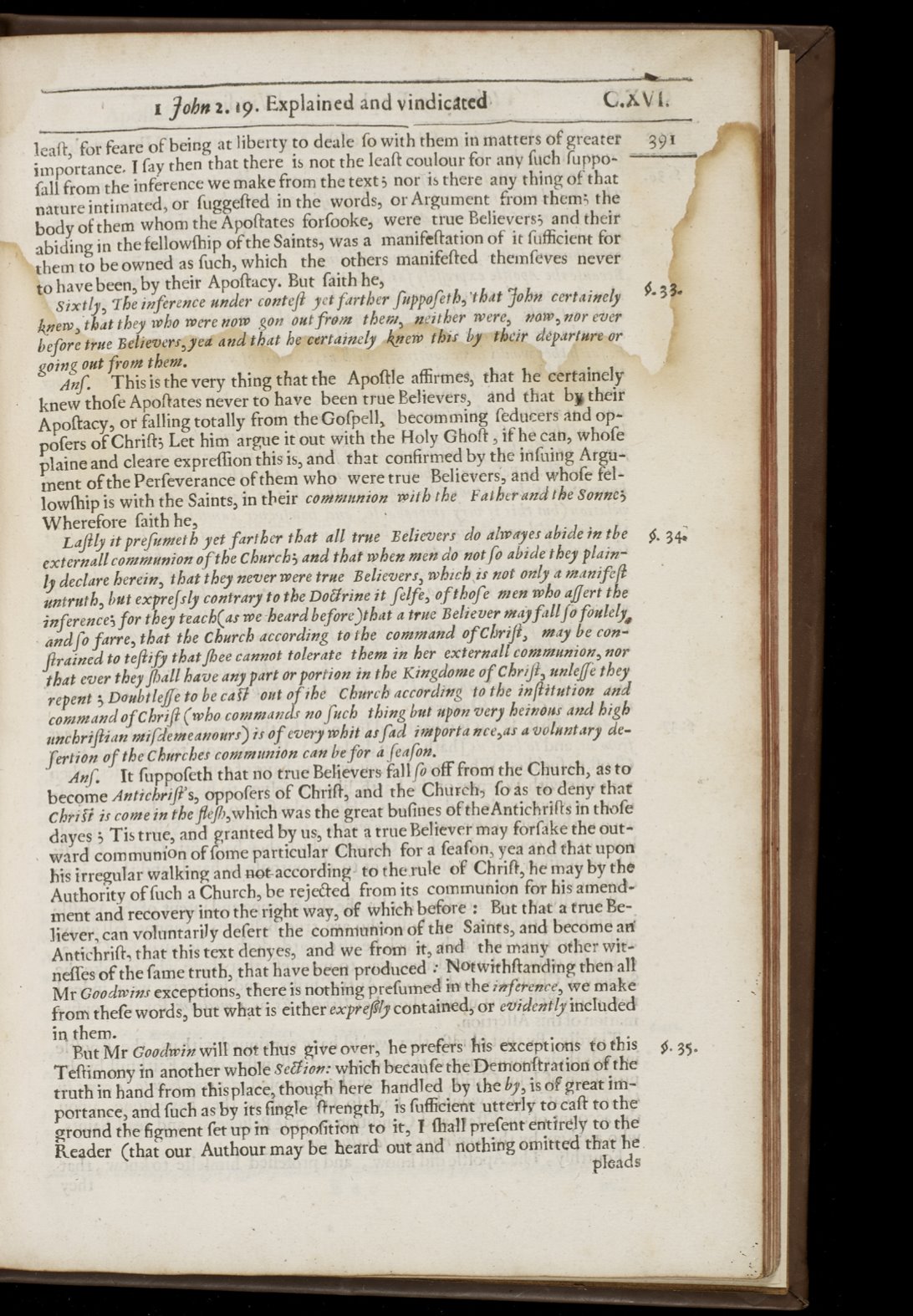

i
john
2.
tg. Explained and vindicated
leaft, for feare
of
being
at liberty to
deale
fo
with them
in
matters
of
greater
391
importance.
I
fay
then
that
there
is
not the lean
coulour for
any
fuch
fuppo-
fall from
the
inference we make from
the
text; nor is
there
any
thing
of that
nature intimated, or
fuggefted
in
the
words,
or
Argument from
them; the
body
of them whom the Apoftates forfooke, were
true
Believers;
and
their
abiding
in
the
fellowfhip
of
the
Saints, was a manifeftation
of
it
fuf
icient for
them
to beowned
as
fuch, which
the
others manifefted themfeves never
to have
been,
by their
Apoftacy. But faith he,
4.3
;.
sixtly,
The
inference
under
conteft
yet
farther
fuppofeth,'1hat
john
certainely
knew,
that
they who were now gon out
from
them,
neither
were,
now, nor ever
before
true Believers,yea
and
that
he
certainely
knew
this
by
their
departure
or
going out
from
them.
Anf.
This
is
the very
thing
that
the
Apoftle
affirmes,
that
he certainely
knew thofe
Apoftates
never
to
have been
true
Believers,
and
that
their
Apoftacy, or
falling
totally
from
the Gofpell,
becomming feducers and
op-
pofers
of
Chrift5
Let
him
argue
it out
with
the
Holy
Ghoft
,
if
he
can, whofe
plaine
and cieare expreffion this
is,
and
that
confirmed
by
the
infuing Argu-
ment
of
the Perfeverance
of
them who were true Believers, and whole fel-
lowfhip
is
with the
Saints,
in
their
communion
with
the
Father
and
the Sonnc;
Wherefore
faith
he,
Laftly
it
prefumeth
yet
farther
that all
true
Believers
do
alwayes
abide
in
the 4.34»
externall
communion
ofthe
Church;
and
that
when men
do
not
fo
abide they
plain-
ly
declare
herein,
that
they
never
were
true
Believers, which
,is not
only
a
ntanifeft
untruth,
but
exprefsly
contrary
to
the
Da
trine
it
felfe,
o
f
thofe men
who
affert
the
inference;
for
they
teach(as
we
-heard
before)that
a true Believer
may
fall
lb
foulely.
and
fofarce,
that
the
Church
according
to
the command
ofChrilt,
may be
con
-
ftrained
to
tetti
fy
that
Thee
cannot tolerate them
in
her
externall
communion,
nor
that
ever they
Jballhave
any
part
or
portion
in
the
Kingdome
of
Chrift,
unlefe
they
repent
;
Doubtlefe
to
be
café out
of
the Church according
to
the
in/titution and
command
ofChrift
(who commands
no
fuch
thing
but
upon
very heinous
and
high
unchriftian
mifdemeanours) is
of
every
whit
as
fad
importa nce,as a voluntary de-
fertion of
the
Churches
communion can
be
for
a
feafon.
Anf.
It
fuppofeth
that
no
true
Believers fall
fo
off
from
the Church,
as
to
become
Antichrift's, oppofers
of
Chrifl, and
the
Church, foás
to
deny
that
Chrilt
is come
in
thefleJh,which
was
the great
butines
of
the
Antichrifts
in
thofe
dayes
5
Tis
true,
and
granted
by
us,
that
a
true
Believer may forfake
the out -
ward communion
of
Ionic
particular
Church for
a
feafon,
yea
and
that
upon
his
irregular
walking and
not-
according
to
the.rule
of
Chrift, he
may
by
the
Authority
of
fuch a
Church, be
rejef
ed from
its communion
for
his
amend-
ment and recovery into
the
right
way,
of
which before
:
But
that
a
true
Be-
liever,
can
voluntarily defert
the
communion
of
the
Saints,
and become an
Antichrift,
that
this
text
denyes,
and
we
from it, and the many
other wit-
neffes
of
the
fame
truth, that
have been produced
:
Notwithftanding then
all
Mr Goodwin
exceptions,
there
is
nothing prefumed
in
the
inference,
we make
from there words,
but
what
is
either
expref?ly
contained, or
evidently
included
in
them.
But
Mr
Goodwin
will not thus
give over, he prefers
Ms
exceptions
to
this
ß
35.
Teflimony
in
another
whole
Seíéion:
which becaufe
the Demonftrat
ion
of
the
truth
in
hand from
Misplace, though here
handled
by
the
by, is
of
great im-
portance, and
fuch
as
by
its tingle
ftrength,
is
fufficient
utterly
to
café
to the
ground
the figment
fet
up
in
oppofition
to
it,
I
fhail
prefent entirely
to the
Reader
(that
our.
Authour may be heard out
and nothing
omitted
that
he
pleads










